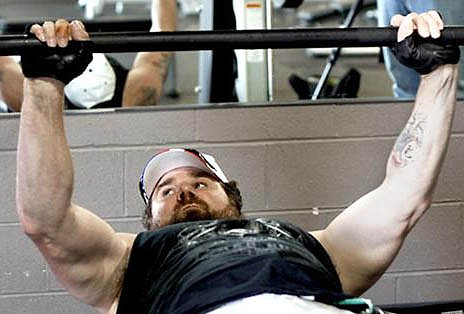Lying on his back, Jesse Hope pumps the bar smoothly above his face. He's pushing 225 pounds of clanking metal plates.
He cranks out 10 repetitions.
"This is just a warm-up," the Catoosa County, Ga., native says with a smile.
Between bench press sets, he slowly rises to his feet and takes a couple shaky steps to his wheelchair. The recently pumped arms roll him to the dumbbell rack for some shoulder work.
He's rebuilding strength at Peak Fitness in Dalton, Ga., after a few months off before the highlight of his year: competing in the National Veterans Wheelchair Games for his 11th time in August.
Bench press is one of five events that Hope, 39, has signed up for, along with shot put, javelin, discus and slalom racing, a wheelchair obstacle-course competition.
Twenty years ago, Hope had just returned from fighting in the first Persian Gulf war and was home in Catoosa County trying to readjust.
"When I came home, I was all messed up in the head," he said. "I tried to ease my pain on my own."
One night, easing his pain meant drinking a half-gallon of whiskey.
"They said they saw me at the Krystal in Ringgold and I was heading home," he said. "Next thing I know, it was six months later, and I was in the VA hospital in Atlanta."
Hope later learned that he had flipped his sports car off a curve in the road and paramedics had found his battered body 20 yards from the car.
The crash broke his left arm and leg, cut off one eyelid and crushed four vertebrae in his lower back. Those crushed vertebrae rendered his legs nearly useless.
It was in the Atlanta veterans hospital that someone invited him to the gym and got him started lifting weights. The former high school football player and soldier always loved pushing himself in the gym.
He heard about the wheelchair games through fellow veterans and signed up.
It was an eye-opening experience. In the hotel lobby of the first competition he saw nearly 500 wheelchairs, and most of those men and women were also veterans. That first competition bonded him to fellow paralyzed veterans, and the games now are a reunion of sorts.
Geoff Hopkins, associate director of sports for the Paralyzed Veterans of America, said Hope's experience is common among the group.
"Quite a few guys come back for the competition each year, and others come back for the camaraderie," he said.
Hopkins knows from experience; he's been paralyzed for 23 years and also competes in handcycling and other events in the games.
Over the years, Hopkins said, paralyzed veterans have made more effort to get out in their communities and find ways to do physical activities, everything from tennis to wheelchair basketball to fishing or bowling.
"I think all of it has changed, particularly the public's perception of veterans," he said. "Particularly with the wars in Iraq and Afghanistan."
Hopkins said the improvement has come from both young and old in wheelchairs. Older veterans broke ground in the 1980s and 1990s and now encourage younger paralyzed veterans to get involved and even mentor them.
On the other end, he said, younger veterans who immediately get involved in activities can help bring into the competitions older generations who may not have felt comfortable in earlier years.
Hope's eyes light up and his face breaks into a wide smile when talking about the games - he looks at each competition as a way to be active.
A few years back, he met the strongest man in a wheelchair in the United States and saw him bench press more than 500 pounds in a competition.
Hope had some friendly words for him.
"I said, 'I'm going to catch you, man,'" Hope said.

